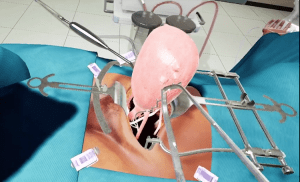
Over the summer of 2021, three SMU undergraduate students and one high school student tested components of a research study training surgeons in Zambia to treat postpartum hemorrhage. Three of the students tested a virtual reality surgical simulation developed for the study.
SMU undergraduate students James Gullett, Thomas Truong and Muaz Wahid, along with high school student Kashvi S., interned in the SMU Center for Global Health Impact in summer 2021. All four tested various components of a research study training surgeons in Zambia to treat postpartum hemorrhage. Thomas and Muaz tested and provided feedback on the virtual reality surgical simulation developed at SMU to train surgeons in performing a simple hysterectomy.
Thomas described his experience “My role in this project was to go through the eLearning course and Virtual Reality simulation as a complete beginner, noting how the material on disease and surgical interventions was presented and detailing my learning experience throughout. What I took away was an incredibly engaging exposure to medicine, education, and the process of learning. In deep diving into the many nuances of a surgical intervention, I was kept afloat by my experiences with the VR simulation, a way to apply my knowledge hands-on. Only by seeing the real-world application in front of me could I make sense of everything I was learning, an interactive style of teaching that I am confident will not only help Zambian physicians, but students everywhere.”
Thomas reflected “As the summer ended, I realized how this internship made me aware of how I can play a larger role in health and education, especially useful in countries like Zambia where there is often one physician per hundreds, if not thousands, of people. As I pursue a career in medicine, the feeling of being constantly engaged and curious during my time at SMU’s Center for Global Health Impact has directed my attention to medical education, a field I now want to impact in my future.”

Muaz, who went into the simulation with confidence given his years of experience with technology through computer video games, was surprised at the level of intricacy and accuracy the simulation required. He shared “Personally, my experience with the hysterectomy surgery simulation made me realize the complexities and challenges of surgery. However, as I watched others like Thomas practice the simulation, I was able to adopt ways to be successful. With a month of practice, I now scored highly with consistency. I was finally able to do the surgery unassisted and help teach others, including a high school student, how to operate the VR.”

Following testing of the virtual reality surgical simulation at SMU, study material was shipped to Zambia. In the Fall of 2021, surgeons in Zambia participated in the study. Data from those participants is being analyzed at SMU.
Interested in learning more about the Center for Global Health Impact? Visit our website, email us at globalhealthimpact@smu.edu and engage with us on Twitter.